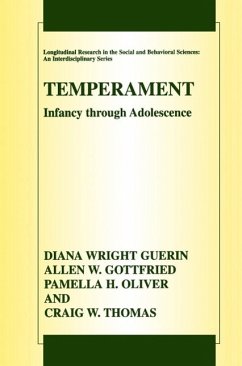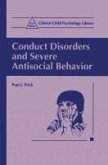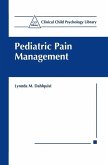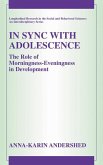Diana Wright Guerin, Allen W. Gottfried, Pamella H. Oliver, Craig W. Thomas
Temperament (eBook, PDF)
Infancy through Adolescence The Fullerton Longitudinal Study
73,95 €
73,95 €
inkl. MwSt.
Sofort per Download lieferbar

37 °P sammeln
73,95 €
Als Download kaufen

73,95 €
inkl. MwSt.
Sofort per Download lieferbar

37 °P sammeln
Jetzt verschenken
Alle Infos zum eBook verschenken
73,95 €
inkl. MwSt.
Sofort per Download lieferbar
Alle Infos zum eBook verschenken

37 °P sammeln
Diana Wright Guerin, Allen W. Gottfried, Pamella H. Oliver, Craig W. Thomas
Temperament (eBook, PDF)
Infancy through Adolescence The Fullerton Longitudinal Study
- Format: PDF
- Merkliste
- Auf die Merkliste
- Bewerten Bewerten
- Teilen
- Produkt teilen
- Produkterinnerung
- Produkterinnerung

Bitte loggen Sie sich zunächst in Ihr Kundenkonto ein oder registrieren Sie sich bei
bücher.de, um das eBook-Abo tolino select nutzen zu können.
Hier können Sie sich einloggen
Hier können Sie sich einloggen
Sie sind bereits eingeloggt. Klicken Sie auf 2. tolino select Abo, um fortzufahren.

Bitte loggen Sie sich zunächst in Ihr Kundenkonto ein oder registrieren Sie sich bei bücher.de, um das eBook-Abo tolino select nutzen zu können.
The Fullerton Longitudinal Study, launched in 1979, chronicled the development of over 100 children and their families from the children's first birthday through their high school completion using a cross-informant/cross-context methodology. In this volume, the developmental course and sequelae of children's temperament from age 1.5 years through high school completion are documented. It is an important resource for developmental researchers, clinicians, educators, and students.
- Geräte: PC
- ohne Kopierschutz
- eBook Hilfe
- Größe: 28.54MB
Andere Kunden interessierten sich auch für
![Conduct Disorders and Severe Antisocial Behavior (eBook, PDF) Conduct Disorders and Severe Antisocial Behavior (eBook, PDF)]() Paul J. FrickConduct Disorders and Severe Antisocial Behavior (eBook, PDF)40,95 €
Paul J. FrickConduct Disorders and Severe Antisocial Behavior (eBook, PDF)40,95 €![Pediatric Pain Management (eBook, PDF) Pediatric Pain Management (eBook, PDF)]() Lynnda M. DahlquistPediatric Pain Management (eBook, PDF)73,95 €
Lynnda M. DahlquistPediatric Pain Management (eBook, PDF)73,95 €![Advances in Clinical Child Psychology (eBook, PDF) Advances in Clinical Child Psychology (eBook, PDF)]() Advances in Clinical Child Psychology (eBook, PDF)73,95 €
Advances in Clinical Child Psychology (eBook, PDF)73,95 €![In Sync with Adolescence (eBook, PDF) In Sync with Adolescence (eBook, PDF)]() Anna-Karin AndershedIn Sync with Adolescence (eBook, PDF)73,95 €
Anna-Karin AndershedIn Sync with Adolescence (eBook, PDF)73,95 €![Adolescence: An Ethological Perspective (eBook, PDF) Adolescence: An Ethological Perspective (eBook, PDF)]() Ritch C. Savin-WilliamsAdolescence: An Ethological Perspective (eBook, PDF)40,95 €
Ritch C. Savin-WilliamsAdolescence: An Ethological Perspective (eBook, PDF)40,95 €![Regional Identity and Behavior (eBook, PDF) Regional Identity and Behavior (eBook, PDF)]() Max SugarRegional Identity and Behavior (eBook, PDF)73,95 €
Max SugarRegional Identity and Behavior (eBook, PDF)73,95 €![Practitioner's Guide to Emotion Regulation in School-Aged Children (eBook, PDF) Practitioner's Guide to Emotion Regulation in School-Aged Children (eBook, PDF)]() Gayle L. MacklemPractitioner's Guide to Emotion Regulation in School-Aged Children (eBook, PDF)40,95 €
Gayle L. MacklemPractitioner's Guide to Emotion Regulation in School-Aged Children (eBook, PDF)40,95 €-
-
-
The Fullerton Longitudinal Study, launched in 1979, chronicled the development of over 100 children and their families from the children's first birthday through their high school completion using a cross-informant/cross-context methodology. In this volume, the developmental course and sequelae of children's temperament from age 1.5 years through high school completion are documented. It is an important resource for developmental researchers, clinicians, educators, and students.
Dieser Download kann aus rechtlichen Gründen nur mit Rechnungsadresse in A, B, BG, CY, CZ, D, DK, EW, E, FIN, F, GR, HR, H, IRL, I, LT, L, LR, M, NL, PL, P, R, S, SLO, SK ausgeliefert werden.
Produktdetails
- Produktdetails
- Verlag: Springer New York
- Seitenzahl: 279
- Erscheinungstermin: 6. Dezember 2012
- Englisch
- ISBN-13: 9781461501756
- Artikelnr.: 43992355
- Verlag: Springer New York
- Seitenzahl: 279
- Erscheinungstermin: 6. Dezember 2012
- Englisch
- ISBN-13: 9781461501756
- Artikelnr.: 43992355
- Herstellerkennzeichnung Die Herstellerinformationen sind derzeit nicht verfügbar.
1. Introduction and Overview.- Pervasiveness of the Temperament Construct.- Contemporary Interest in the Concept of Temperament.- Uniqueness of the Fullerton Longitudinal Study for Investigating Temperament.- The NYLS Framework.- The Nine NYLS Temperament Dimensions.- The Concept of Difficult Temperament.- Other Child-Focused Models of Temperament.- to Issues Investigated.- 2. Methodology of the Fullerton Longitudinal Study and Data Analytic Strategy.- FLS Assessment Waves.- Participants.- Delineation of Developmental Eras.- Tests for Attrition Bias.- Use of Parent Report Measures.- Temperament Measures Used in the FLS.- Measures Collected in Other Developmental Domains and the Environment.- Intercorrelations Among Temperament Dimension Scores.- Use of Extreme Temperament Groups.- 3. Consistency and Change in Temperament.- Issues Investigated.- Description of Measures Used in the FLS.- Findings and Discussion.- Summary and Conclusions.- 4. Temperament and Behavioral/Emotional Adjustment.- Issues Investigated.- Description of Measures Used in the FLS.- Findings and Discussion.- Summary and Conclusions.- 5. Temperament and Intelligence.- Issues Investigated.- Description of Measures Used in the FLS.- Findings and Discussion.- Summary and Conclusions.- 6. Temperament in the School Context.- Issues Investigated.- Description of Measures Used in the FLS.- Findings and Discussion.- Summary and Conclusions.- 7. Temperament in the Family Context.- Issues Investigated.- Description of Measures Used in the FLS.- Findings and Discussion.- Summary and Conclusions.- 8. Temperament in the Extremes-Developmental Trajectories of Infants in Three Temperament Groups.- Issues Investigated.- Description of Measures Used in the FLS.- Findings and Discussion.- Summary and Conclusions.- 9.Synthesis and Implications.- Temperament from Infancy through Adolescence: Pathways and Trajectories.- Differential Developmental Significance of Temperament Dimensions.- Implications of Findings Regarding Temperamental Continuity/Stability.- Temperament as a Precursor of Personality.- Temperament Dimensions as Sequelae of Earlier Development.- Evidence that Temperament is a Useful Construct Beyond Parent-Child Interactions/Relationship.- Temperament in the Classroom.- Temperament-Environment Interactions.- Temperament as an Asset and Liability in Development.- Long-Term Sequelae of Temperament Assessed in Infancy.- Temperament from Infancy through Adolescence.- References.- Author Index.
1. Introduction and Overview.- Pervasiveness of the Temperament Construct.- Contemporary Interest in the Concept of Temperament.- Uniqueness of the Fullerton Longitudinal Study for Investigating Temperament.- The NYLS Framework.- The Nine NYLS Temperament Dimensions.- The Concept of Difficult Temperament.- Other Child-Focused Models of Temperament.- to Issues Investigated.- 2. Methodology of the Fullerton Longitudinal Study and Data Analytic Strategy.- FLS Assessment Waves.- Participants.- Delineation of Developmental Eras.- Tests for Attrition Bias.- Use of Parent Report Measures.- Temperament Measures Used in the FLS.- Measures Collected in Other Developmental Domains and the Environment.- Intercorrelations Among Temperament Dimension Scores.- Use of Extreme Temperament Groups.- 3. Consistency and Change in Temperament.- Issues Investigated.- Description of Measures Used in the FLS.- Findings and Discussion.- Summary and Conclusions.- 4. Temperament and Behavioral/Emotional Adjustment.- Issues Investigated.- Description of Measures Used in the FLS.- Findings and Discussion.- Summary and Conclusions.- 5. Temperament and Intelligence.- Issues Investigated.- Description of Measures Used in the FLS.- Findings and Discussion.- Summary and Conclusions.- 6. Temperament in the School Context.- Issues Investigated.- Description of Measures Used in the FLS.- Findings and Discussion.- Summary and Conclusions.- 7. Temperament in the Family Context.- Issues Investigated.- Description of Measures Used in the FLS.- Findings and Discussion.- Summary and Conclusions.- 8. Temperament in the Extremes-Developmental Trajectories of Infants in Three Temperament Groups.- Issues Investigated.- Description of Measures Used in the FLS.- Findings and Discussion.- Summary and Conclusions.- 9.Synthesis and Implications.- Temperament from Infancy through Adolescence: Pathways and Trajectories.- Differential Developmental Significance of Temperament Dimensions.- Implications of Findings Regarding Temperamental Continuity/Stability.- Temperament as a Precursor of Personality.- Temperament Dimensions as Sequelae of Earlier Development.- Evidence that Temperament is a Useful Construct Beyond Parent-Child Interactions/Relationship.- Temperament in the Classroom.- Temperament-Environment Interactions.- Temperament as an Asset and Liability in Development.- Long-Term Sequelae of Temperament Assessed in Infancy.- Temperament from Infancy through Adolescence.- References.- Author Index.







